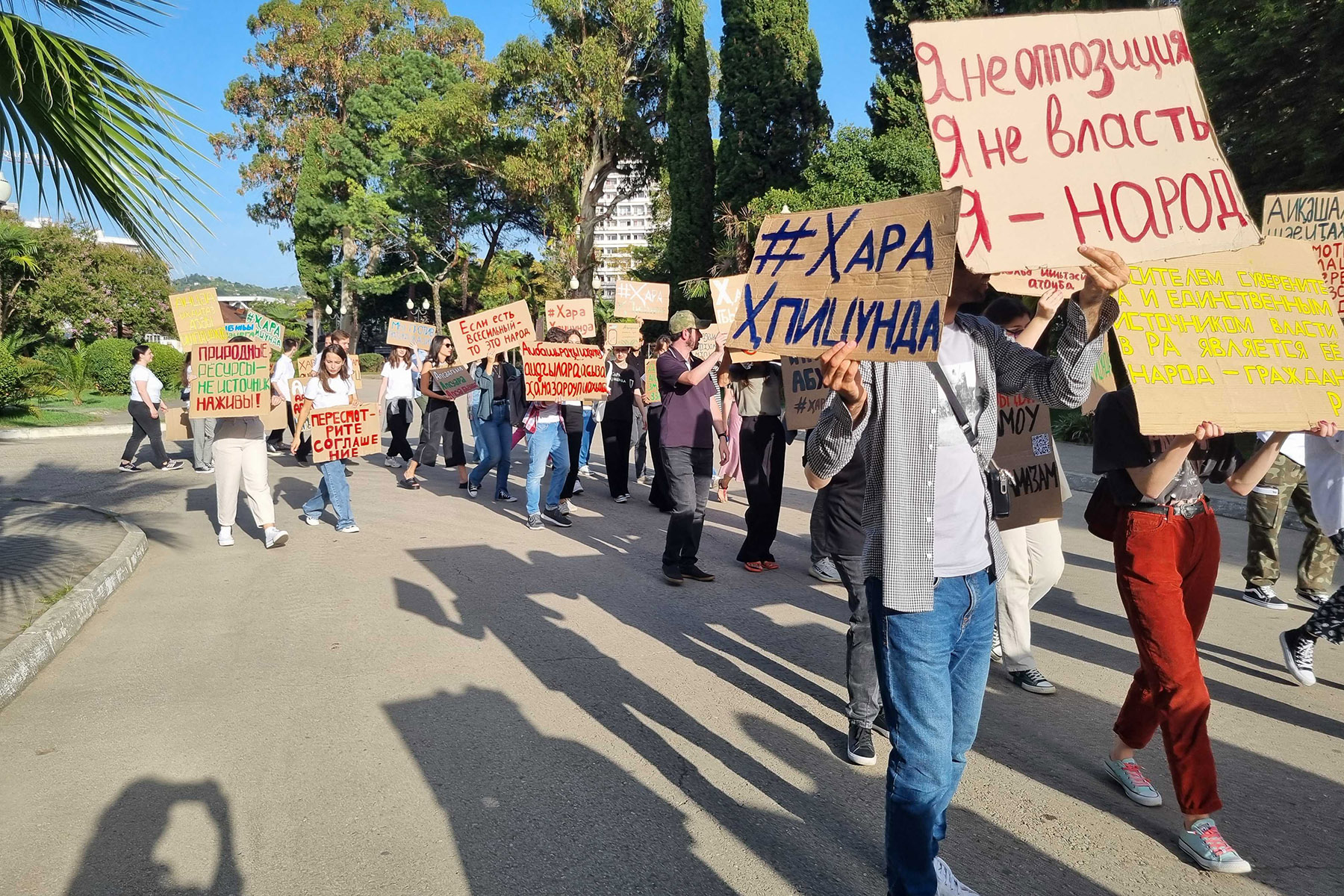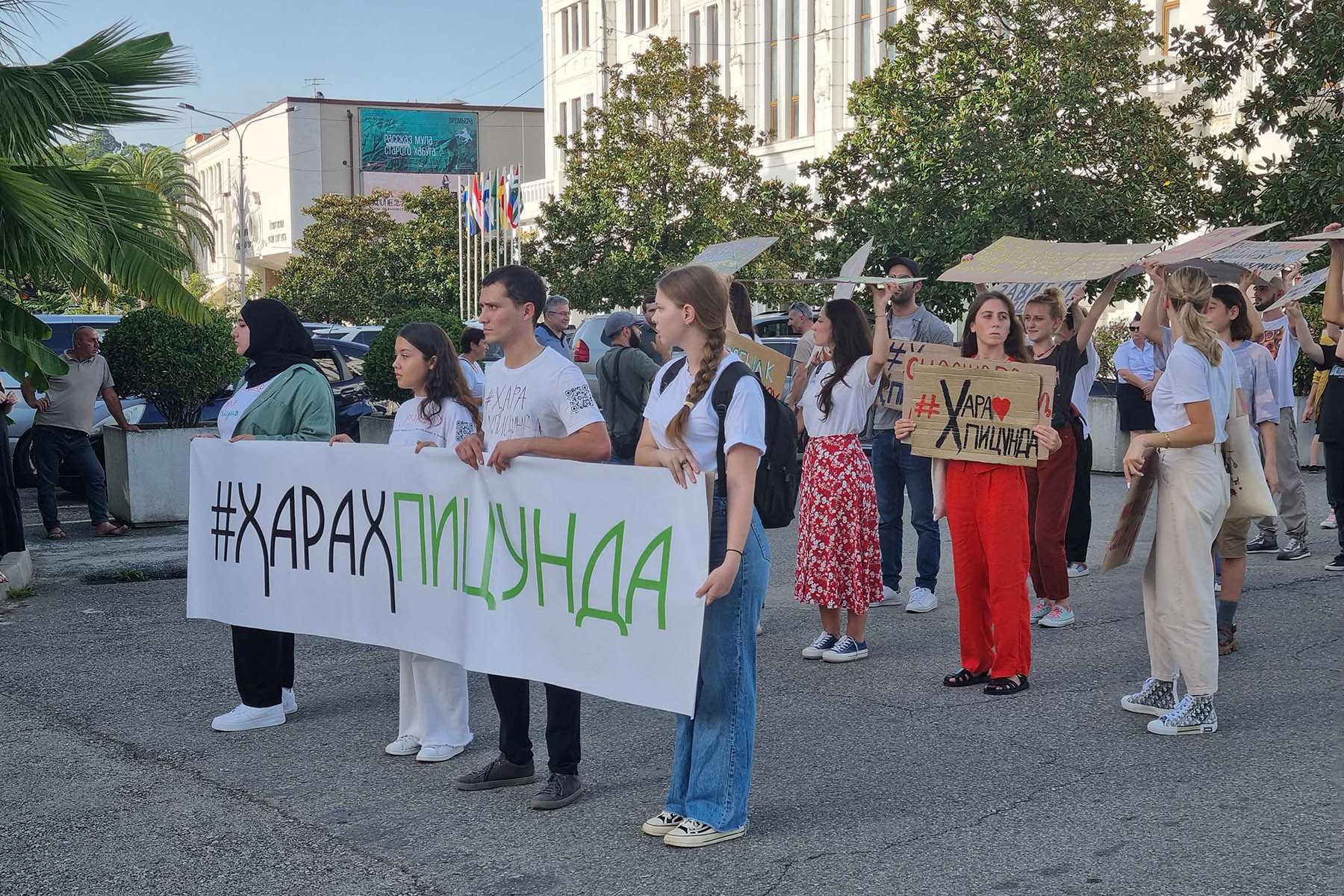
In the debate in Abkhazia about the transfer of a state dacha to Russia, young people have taken to the streets to ensure their opposition is heard.
On 17 September, the Hara H-Pitsunda (‘Our Pitsunda’) movement took to the streets of Sukhumi (Sukhum) to protest the handover of a Soviet-era state dacha to Russia.
The procession took place in silence, but its ideas resonated loudly, as hundreds of young people marched through the centre of the Abkhazian capital holding signs protesting the deal.
The agreement dates back to 1995, when Abkhazia’s first president, Vladislav Ardzinba, agreed to rent the dacha in Pitsunda (Bichvinta) to the Russian Federal Protective Service for 49 years. It came with an adjoining 186 hectares of land on the Black Sea coast. This agreement was extended in January 2022, amid criticism from activists and legal experts who questioned the legality of the contract.
[Read more: Abkhazia debates transfer of Pitsunda dacha to Russia]
With youth and student activists at its forefront, the movement has its roots in a social media campaign of the same name. One of the organisers, student activist Naida Abidova, told OC Media that many people in Abkhazia support their campaign — albeit not always openly.
‘Many people write us words of support. Some say they cannot join and speak out publicly, but they support us. There are a lot of them’, says Abidova.

Not necessarily anti-Russian
This was the second such demonstration carried out by the Hara H-Pitsunda. Their first rally was met with some backlash, with some media referring to them as ‘children’ — none of the participants took offence, but they were taken aback given that all of them were old enough to vote.
‘Many of us are university graduates and senior year students. We are all capable citizens with the right to vote’, Abidova tells OC Media.
Some politicians in Abkhazia have also attempted to detract from Hara H-Pitsunda’s work by accusing the group of being backed by ‘political forces’. However, Abidova stresses that all their members are independent from any political party, movement, or organisation.
Instead, she says that the members of Hara H-Pitsunda are united by a singular goal: ‘the independence of Abkhazia and the preservation of its territory, resources, and heritage’.
‘We were born in a free country. And we want to keep it that way for future generations’, Abidova says. ‘We value the territory our elders liberated, the natural resources we must protect in today’s world, and our historical and cultural heritage. If someone thinks that by defending these things, we’re doing the bidding of the political opposition, then they are wrong.’
Abidova also stresses that they are not protesting against Russia; this is a protest over a domestic issue in their mind. Their protest, they say, is against local officials, who could have retained ownership of the land, as the constitution prohibits the sale of land to foreigners or non-Abkhaz entities.
‘We love Russia. Many [of us] have studied there, there is no need to interpret our actions as anti-Russian. It’s not like that’, says Abidova.
‘I want to believe that people who are worried about their country have nothing to fear, I want to believe that our values are widely supported. I want to believe that people who stand for the independence of Abkhazia cannot be portrayed in a bad light, because their position is right’, she adds.

Who are Hara H-Pitsunda?
Naida Abidova is the granddaughter of Anzor Agumaa, a local architect and author of the book Old Sukhum. He devoted his life to studying and preserving the historical and architectural heritage of Sukhumi, and experienced the loss of any building in the city as a personal tragedy.
Some protesters are the children of politicians, and one member of the movement is the son of the executive director of Abkhazia’s first independent TV channel, Abaza TV.
Many of the young activists were first involved in the #abkhaziaisnotgeorgia (#абхазияэтонегрузия) movement. It took off in March of this year after Circassian film and TV director Kantemir Balagov posted a photograph of a new tattoo, which symbolised Georgia, Ukraine, and Russia together, and called for peace amongst the countries.
The tattoo, which Abkhazians understood as implying that Abkhazia was a part of Georgia, prompted many young Abkhazians to share their perspectives on the issue.
Alexandra Bargandzhia, another activist from the Hara H-Pitsunda movement, says that it is particularly frustrating to be called traitors after having put such effort into advocating for Abkhazia.
‘We have done so much to raise awareness about Abkhazia, and now they are labelling us and trying to find ulterior motives behind our protest. It really upsets and angers us’, says Alexandra.
On social media, users, mostly under anonymous nicknames, suggest that a Western influence is evident in the movement’s actions.
Said Gezerdaa, a lawyer who also took part in the protest, says that while there have been attempts to portray their movement as something they are not, he is not worried by this, as the movement has seen a huge increase in public support.
Abkhazia’s ‘young leaders’
On 23 September, a meeting was held between Abkhazian and Russian ‘young leaders’ at the Ministry of Foreign Affairs of Abkhazia.
According to the event announcement, the discussion was supposed to cover youth initiatives in the region and build connections between young leaders from Abkhazia and Russia. However, instead, the two-hour conversation was devoted to discussing the ratification of the Pitsunda dacha agreement.
Members of the Hara H-Pitsunda movement were invited to the meeting but did not attend. For the most part, the ‘young leaders’ tried to maintain neutrality, claiming that they lacked knowledge of the issue or did not have a position on the matter.
But there were also opponents of the agreement at the table. Some were concerned about the future of the Pitsunda pine, which is found only in that region, while others were concerned with keeping the state dacha Abkhazian.
During the meeting, Nart Dbar, a member of the Apeipsh youth organisation, said that the Abkhazian side needed to approach the issue more pragmatically and consider their interests since, in his opinion, Russia has been guided solely by its own interests.
‘Russia has set up military bases here not to please our eyes’, he said.
The Minister of Foreign Affairs, Inal Ardzinba, responded that today, Russia is the only country whose interests converge with Abkhazia’s, and that it was therefore necessary to make concessions to a strategic partner.
For ease of reading, we choose not to use qualifiers such as ‘de facto’, ‘unrecognised’, or ‘partially recognised’ when discussing institutions or political positions within Abkhazia, Nagorno-Karabakh, and South Ossetia. This does not imply a position on their status.









